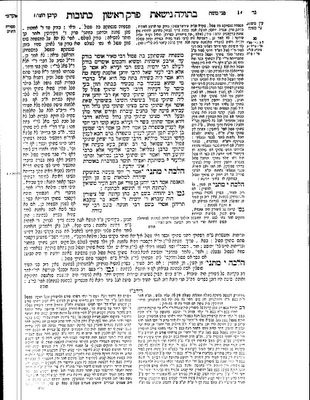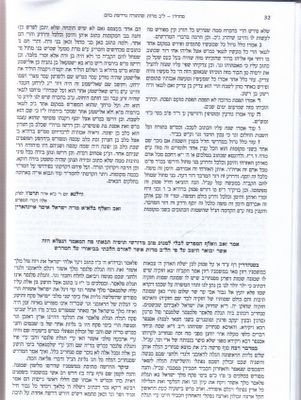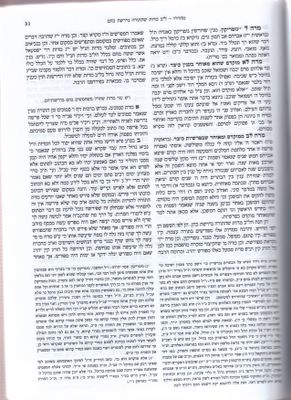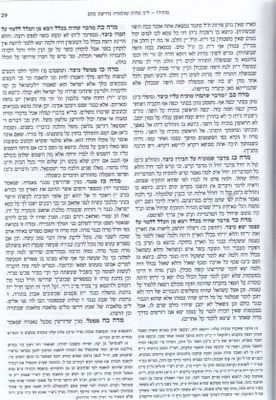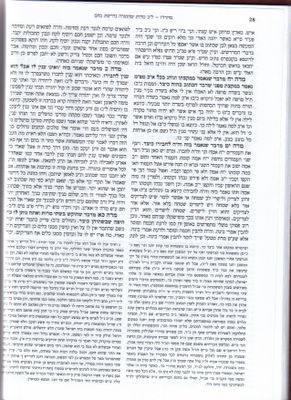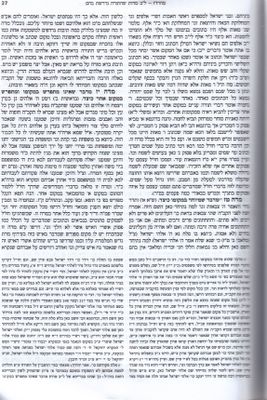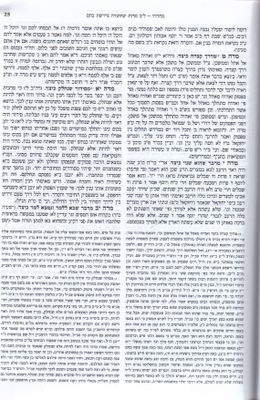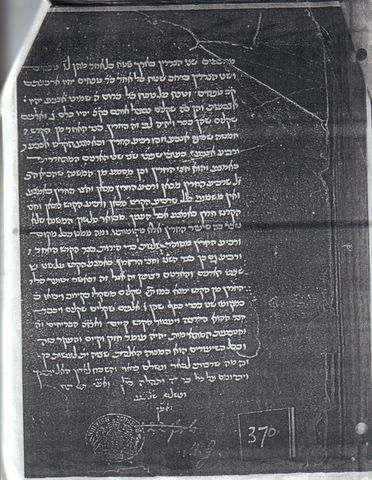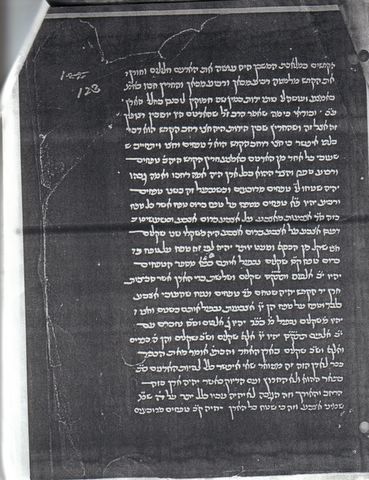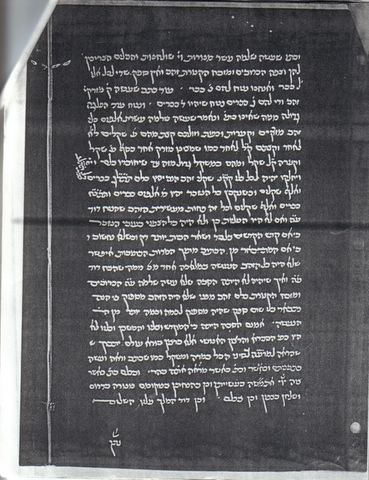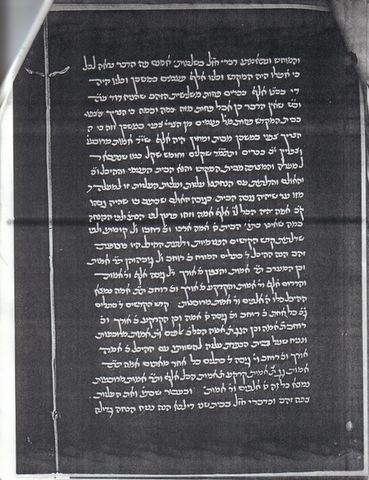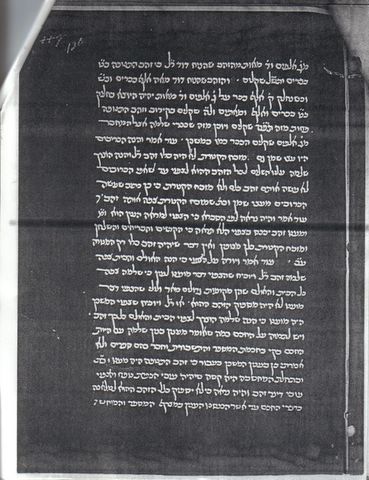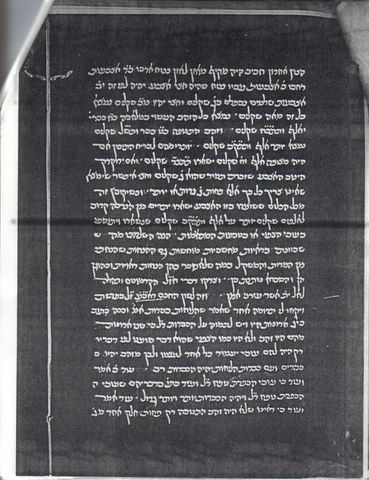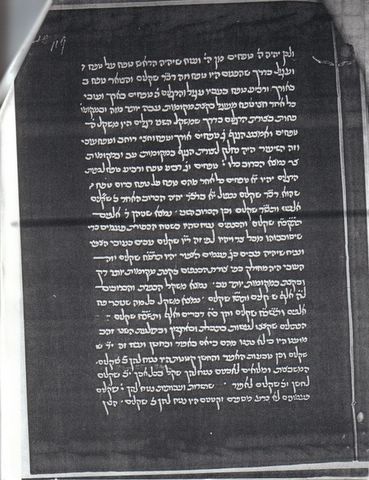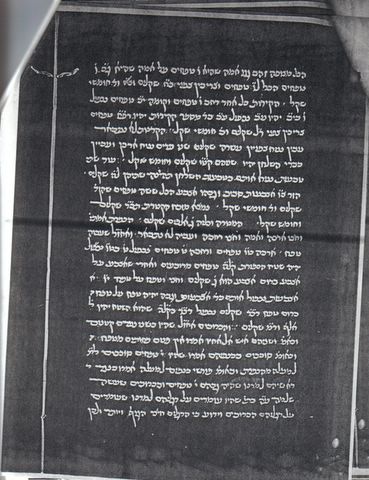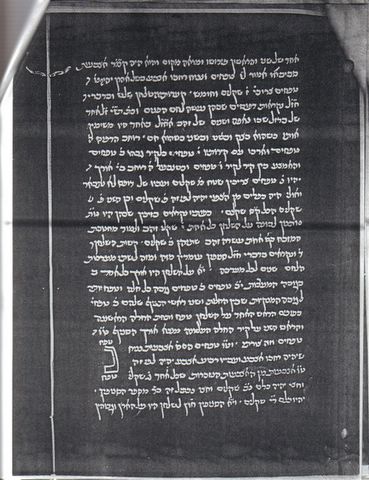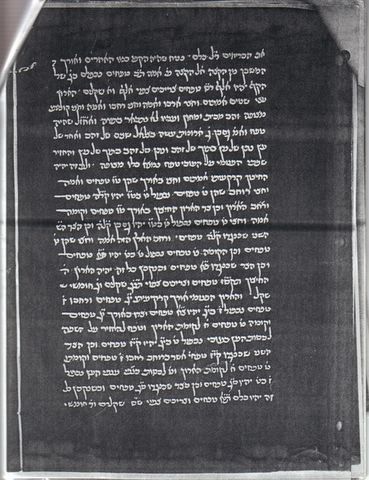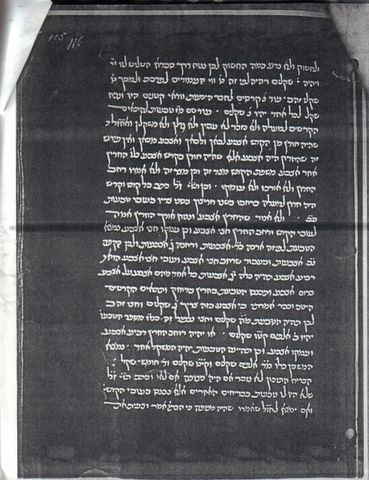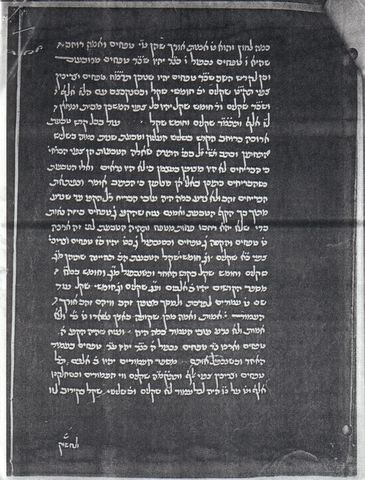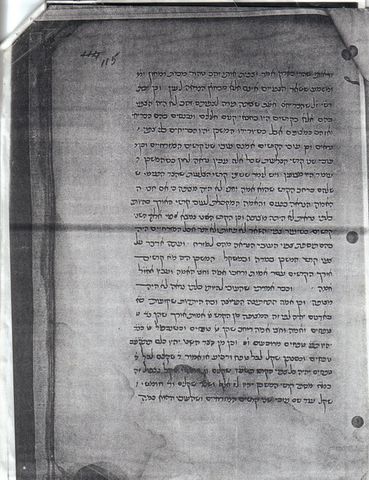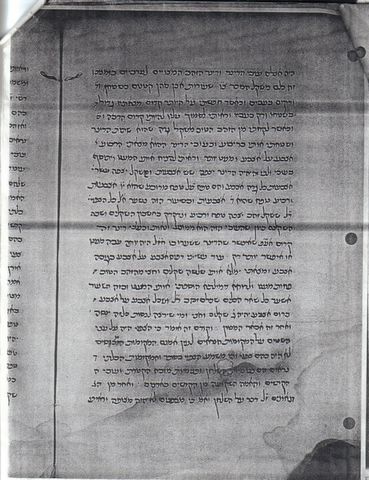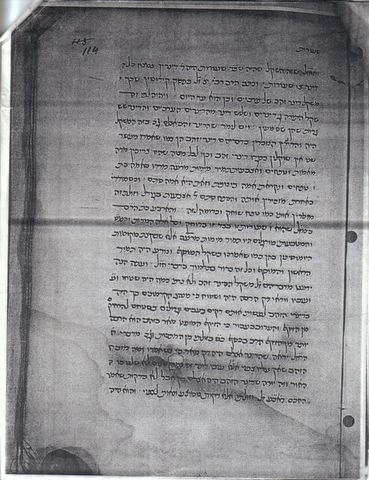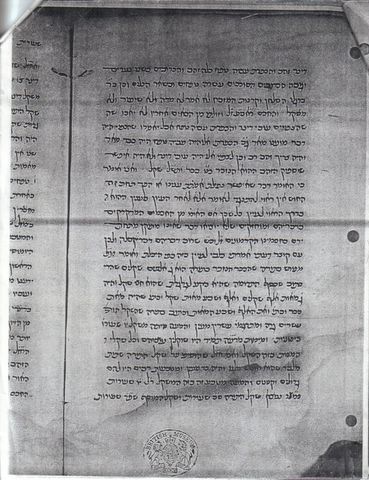ibn al achdav
Sunday, December 04, 2005
Thursday, June 23, 2005
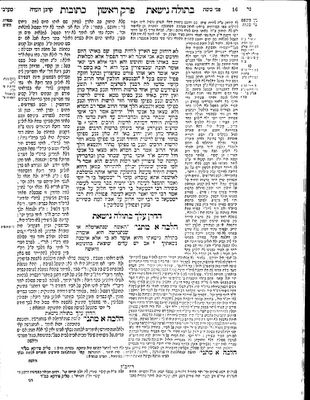
ket8b
the am ha`aretz was not muchzak to grind there that day, and you should suspect?
And here {by the sealed city} I say, the illegitimately born person did not descend except to fill water on that day, and you should suspect?
But Rabbi Ila, Rabbi Yannai says: within Tzippori he had intercourse?
But Rabbi Bo cited Rabbi Yannai: If they saw him separate from Tzippori and have intercourse, there is a chazaka that someone of illigitimate birth from there had intercourse?
And where it is found {Rabbi Yannai holds} we go after the majority.
With difficulty, the Sages compared it to sheratzim.
For they learnt {tnei}: Nine {dead} frogs {which do not convey ritual impurity}, and among them one sheretz, in a private domain, and he touched one of them and does not know which of them he touched, the doubt is impure.
If it separated to the public domain and he touched, the doubt is pure.
If it {the doubt} returned to the private domain and he touched, the doubt is impure.
And where it is found, he goes after the majority.
Rav Chisda said {=asked}: And all these men of valor did not find their hands?
Rabbi Ami said: Blessed be He who chose them and their words.
{Returning to Rav Chisda - }
Before you compare it to a private domain, compare it to a public domain!
For we learn {tnei}: Nine sheratzim, and one frog amongst them, in the public domain, and he touched one of them and does not know which of them he touched, the doubt is pure.
If it separated to the private domain and he touched it, his doubt is impure.
If it returned to the public domain and he touched it, his doubt it pure.
And where it is found, he goes after the majority.
Rav Chisda said: The men of valor did not find their hands!
Rabbi Imi said: Blessed be He who chose them and their words.
{And the reason we do not go leniently is}
The market of Tzippori is not a public domain.
Rabbi Yossi said: since both of them are able to be alone together, it is like a private domain.
There was a case with a girl that they found cast to the refuse area. The case came before Rabbi Yishmael bei Rabbi Yossi, and he said: she is combined to the "dough."
Rabbi Yirmiya thought to say: kosher "dough."
Rabbi Yishmael bei Rabbi Yossi argues with his father.
Rabbi Yossi said: Even if you say to pasul dough, Rabbi Yishmael bei Rabbi Yossi does not argue with his father.
Why?
"Kosher" people will engage in improper sexual relations, while "pesulim" cast.
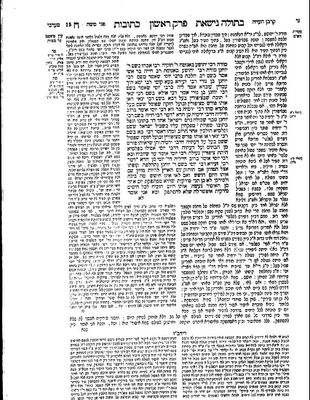
ket8a
Rabbi Yehoshua admits in case of rape.
Rabbi Chizkiya, Rabbi Abahu citing Rabbi Yochanan: Rabbi Yehoshua admits in case of rape.
Rav Chiyya bar Ashi cited Rav: The halacha is like Rabbi Yossi who cited Rabbi Yochanan ben Nuri.
Rabbi Zera asked before Rabbi Yasa: How do we actually practice?
He said to him: Like Rabbi Yossi who cited Rabbi Yochanan ben Nuri.
Rabbi Ila cited Rabbi Yannai: within Tzippori he had intercourse.
Rava (=Rabbi Ba = Rabbi Abba) cited Rabbi Yannai: If they saw him separate from Tzippori and have intercourse, there is a chazaka that someone of illigitimate birth from there had intercourse.
A platia {public domain}, what?
Rabbi Yirmiya bar Vo, Rabbi Yossi says: based on the majority.
The strength of Rabbi Yirmiya is from this that Rabbi Chiyya cited Rabbi Yochanan: an alleyway of which the majority are gentiles, and one Israelite lived in it, and something collapses within it [upon someone], we remove stones because of the one Israelite there.
And a platia, we go after the majority.
And what of {=how do you explain} that which Rabbi Bo cited Rabbi Yannai, that if they saw him separate from Tzippori and have intercourse, there is a chazaka that someone of illigitimate birth from there had intercourse?
According to Rabbi Yannai, this is where they him separate from one of the houses.
And according to Rabbi Yossi, even in a platia - for Tzippori was shut in.
Rabbi Yossi says: Until he proves.
And {yet} here: Rabbi Yossi says: based on the majority.
The strength of Rabbi Yossi is from this that Rabbi Zera cited Rabbi Yochanan: if his basket was switched at the grinder's, if one who is muchzak to be an am haaretz ground there that day, he must worry, and if not, he does not worry.
What is the difference between this and the sirki ?
Did we not learn {tnei}: a sirkit {a marketplace of Ishmaelites} that sells forbidden material one day, that day becomes a proof for all days.
A sirkit, it is possible to last selling permitted materials,
And here, I say
MISHNAH. R. JOSE SAID: IT HAPPENED THAT A GIRL. WENT DOWN TO DRAW WATER FROM A SPRING AND SHE WAS RAVISHED.
R. JOHANAN B. NURI SAID: IF MOST OF THE INHABITANTS OF THE TOWN MARRY [THEIR DAUGHTERS] INTO THE PRIESTHOOD, THIS [GIRL] MAY [ALSO] MARRY INTO THE PRIESTHOOD.
Rav Yehuda cited Rav Kohen: It was the market day in Tzippori that the case was.
Rabbi Yirmiya, Rabbi Chama bar Ukva - both cite Rabbi Chanina who cited Rabbi Yannai:
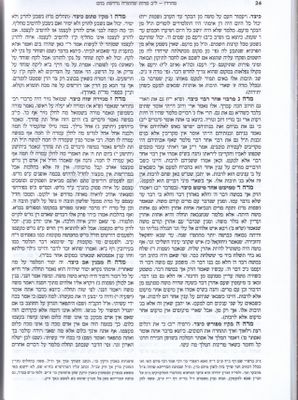
m2
min to exclude, howso?
Shemot 18:13:
Is it possible the entire day? When do the disciples learn? Therefore it comes to teach "from the morning" as an exclusion, which teaches that he did not sit there the entire day. And the chachamim gave an estimate of until 6 hours.
Discussion/Clarification: Not that this is how long Moshe judged, because otherwise what is meant by "until evening. Rather, this is a reference to Shabbat 10a {Rif Shabbat 4a}:
Rav Chisda and Rabba bar Rav Huna were sitting all day engaged in judgements, and their hearts grew faint. {Rashi: since they were not able to learn Torah. Alternatively, they grew faint because they had not opportunity to eat all day.} Rav Chiyya bar Rav, of Difti, taught {tnei} (Shmot 18:13:)
יג וַיְהִי, מִמָּחֳרָת, וַיֵּשֶׁב מֹשֶׁה, לִשְׁפֹּט אֶת-הָעָם; וַיַּעֲמֹד הָעָם עַל-מֹשֶׁה, מִן-הַבֹּקֶר עַד-הָעָרֶב. 13 And it came to pass on the morrow, that Moses sat to judge the people; and the people stood about Moses from the morning unto the evening. And does it enter your mind that Moshe sat and judged the entire day? And the {teaching/learning of} Torah, when was it done? Rather, to tell you that every judge who judges a true judgment {that is, a fair judgement}, even for one hour, the Scriptures considers him a partner in Creation. It is written here מִן-הַבֹּקֶר עַד-הָעָרֶב - from the morning unto the evening, and it is written there, by the Creation {Bereishit 1}, וַיְהִי-עֶרֶב וַיְהִי-בֹקֶר - "and there was evening and there was morning."
Until when must they {the judges} sit at judgment?
Rav Sheshet said: Until the time of the [main] meal [of the day].
And this is the sixth hour, which is the time of eating for a {Torah} scholar.
so this is what is meant by how the Sages estimated it. And note that besides the exclusive min, there is another midrashic method in play here - that of parallel language.
begin cite:
Similarly, Shmuel Bet 22:14:
| יד יַרְעֵם מִן-שָׁמַיִם, ה; {ר} וְעֶלְיוֹן, יִתֵּן קוֹלוֹ. {ס | 14 The LORD thundered from heaven, and the Most High gave forth His voice. |
And so it says:
| ה יַרְעֵם אֵל בְּקוֹלוֹ, נִפְלָאוֹת; עֹשֶׂה גְדֹלוֹת, וְלֹא נֵדָע. | 5 God thundereth marvellously with His voice; great things doeth He, which we cannot comprehend. |
(The explanation of this method, too, is that these three words come always to exclude, from that subject matter that it is speaking of. And within this method are other words or letters that come to exclude when they are extra.)
{I would categorize it differently - that these three words literally, and by themselves, connote exclusion, and thus they are being taken hyper-literally.}

m1
First middah: From a Ribbuy, how so?
The ribbuy utilized three terms. את, גם, אף.
את:
(Bereishit 21)
| א וַה פָּקַד אֶת-שָׂרָה, כַּאֲשֶׁר אָמָר; וַיַּעַשׂ ה לְשָׂרָה, כַּאֲשֶׁר דִּבֵּר. | 1 And the LORD remembered Sarah as He had said, and the LORD did unto Sarah as He had spoken. |
| ו וַתֹּאמֶר שָׂרָה--צְחֹק, עָשָׂה לִי אֱלֹהִים: כָּל-הַשֹּׁמֵעַ, יִצְחַק-לִי. | 6 And Sarah said: 'God hath made laughter for me; every one that heareth will laugh on account of me.' |
Begin cite:
In a similar vein, you say (Mishlei 17):
| כד אֶת-פְּנֵי מֵבִין חָכְמָה; וְעֵינֵי כְסִיל, בִּקְצֵה-אָרֶץ. | 24 Wisdom is before him that hath understanding; but the eyes of a fool are in the ends of the earth. |
| כה עֹז-וְהָדָר לְבוּשָׁהּ; וַתִּשְׂחַק, לְיוֹם אַחֲרוֹן. | 25 Strength and dignity are her clothing; and she laugheth at the time to come. |
Discussion:
את as the marker of the object, as opposed to subject. The function of את in other situations.
Bereishit 4:
What is the function of את in the second pasuk?
(Midrashic hint: only Eve was created from Adam's rib/tail/back)
What is the function of את in Bereishit 22:3?
begin cite.
גם: how does it include?
Shemot 12:31:
Shemot 10:25):
begin cite
similarly, you say:
Dvarim 22:
Discussion: This is halachic or aggadic? How exactly is the גם functioning? How exactly is שְׁנֵיהֶם now functioning?
Before proceeding, one of my favorite גםs. Shemot 7:
(Midrash: Pharoah's wife, students of magicians.) What does this show about the role of גם?
Answer: of a like kind to that to which it is joined.
How does this fit into the mood of the perek?
begin cite:
אף to include, how?
II Kings 2:
And so it states
Discussion:
What does the English expression "take up the mantle" mean?
What is the theme of this perek?
What is the import of two tzadikim vs. one? Suggestion: being solitary - now have to stand as own man, as opposed to being sidekick.
Note how both אף and the "double portion" connote extra.
begin cite:
So too you find 8 miracles by Eliyahu and 16 by Elisha.
Similarly, in Iyyov 37: (Note: Elihu's speech)
| יא אַף-בְּרִי, יַטְרִיחַ עָב; יָפִיץ, עֲנַן אוֹרוֹ. | 11 Yea, He ladeth the thick cloud with moister, He spreadeth abroad the cloud of His lightning; |
(A perush in parentheses: The meaning of this midda - that these three words - אף, גם, את. come always to include. And within this midrashic method is that every extra word or letter comes to include, except that the Tanna only mentioned something which is constant, since these three words include in every place that they are written. Meanwhile, the other words only include when they are extra. And the inclusion in all places is of the subject by which it is written. And this is of the 13 hermenutical methods of the matter which is learnt from its subject matter. and not of something which is not of its subject matter. And the rest of the words explaining the brayta in this method and in all of the remaining methods, with many examples, all is made clear at length in my sefer Midrash Tanaim. דרוש משם. And it requires investigation, for we do not find further that the word אף comes to include.)
Middah 2:
Via a miut {exclusion}, howso?
The miut consists of three terms: אך, רק, מן.
אך, to exclude, how?
For it is written (Bereishit 7)
That even Noach in the ark was spitting up blood because of the cold.
Discussion: What is the feel of the perek. How does this expand upon the idea of a single person surviving of the entire world, while massive forces were wreaking havoc outside. The ark as a flimsy refuge.
begin cite:
Similarly you say (Vayikra 23:27):
Discussion: what does it mean to afflict, and how those who do not afflict will be cut off - in the subsequent psukim? Could this feed into the message here?
begin cite:
רק to exclude, how?
Bereishit 20:
Discussion: see pasuk 8, which this is a reference to. What is it that Avimelech told them that made them "sore afraid." What insight is the midrash giving us about the men's character?
Further, why did they ask about Sarah? Is Avraham justified? Why does Hashem need to give a threat about not returning her to Avraham?
begin cite:
And so it states
| ח וַיַּשְׁכֵּם אֲבִימֶלֶךְ בַּבֹּקֶר, וַיִּקְרָא לְכָל-עֲבָדָיו, וַיְדַבֵּר אֶת-כָּל-הַדְּבָרִים הָאֵלֶּה, בְּאָזְנֵיהֶם; וַיִּירְאוּ הָאֲנָשִׁים, מְאֹד. | 8 And Abimelech rose early in the morning, and called all his servants, and told all these things in their ears; and the men were sore afraid. |
Discussion: How could Micah lie? Was this a blessing/prayer, or a prophecy? Look at the context of the perek. Who suggested bringing the prophet? What is the king of Israel's (as opposed to that of Judah) attitude in general towards Micah? Does he believe in the truth of prophecy? Why then, his calling the prophet? Why then the objection to Michah's initial words?
to be continued...


